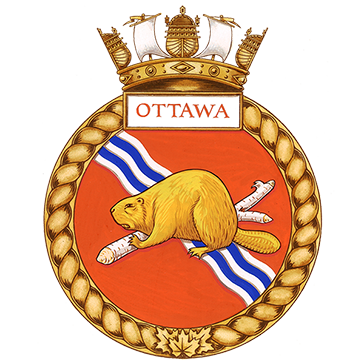HMCS Ottawa
The official lineage of HMCS Ottawa extant commissioned ship.

Badge
Description
Gules a bend wavy Argent charged with two cotises wavy Azure over all a beaver Or the sinister forepaw resting on a log of silver birch proper.
Significance
The design is derived from the unofficial pre-war and war-time badge of Ottawa, a beaver on a log of wood. The white and blue wavy bend represents the Ottawa River after which the ship is named. The red field is intended to refer to those Outaouais or Ottawans who travelled this river and from whom the name was derived.
Motto
EGOR BEOFOR (Ocean beaver)
Colours
Red and White
Normal heraldic colours, the principal colours in the badge, would be gold and red, but the official Colours of Canada, white and red, are used instead because the capital of Canada lies on the Ottawa River.
Battle Honours
The Second World War
ATLANTIC, 1939-45, NORMANDY, 1944, ENGLISH CHANNEL, 1944, BISCAY, 1944.
SOUTH-WEST ASIA
ARABIAN SEA
Lineage
First of Name
- Destroyer, River Class.
- Ex - HMS Crusader.
- Commissioned 15 June 1938.Footnote 1
- Sunk 14 September 1942.Footnote 2
Second of Name
- Destroyer, River Class.
- Ex - HMS Griffin; ex - HMCS Griffin
- Commissioned 7 April 1943.Footnote 3
- Paid off 12 October 1945.Footnote 4
Third of Name
- Destroyer, St. Laurent Class.
- Commissioned 10 November 1956.Footnote 5
- Paid off 24 May 1963.Footnote 6
- Recommissioned 28 October 1964.Footnote 7
- Paid off 31 July 1992.Footnote 8
Fourth of Name
- Frigate, Halifax Class.
- Commissioned 28 September 1996.Footnote 9
Operational history
The Second World War
Ottawa (1st) served on escort duties off the eastern Canadian coast, in the North Atlantic and in the Caribbean Sea under the orders of the 'Commander-in-Chief Atlantic and West Indies'. She was sunk by the German submarine U91 while on convoy duty.Footnote 10 Ottawa (2nd) served on escort and anti-submarine duties in the North Atlantic and off the coast of Normandy with the 'Mid-Ocean Escort Force'. She participated in the destruction of the German submarines U621, U678 and U987, and the Italian submarine Faa di Bruno.Footnote 11
South-West Asia
Ottawa (4th) participated in the second deployment designated Roto 1 from February to August 2002. Tasks performed included supporting Maritime Interdiction Operations (MIO) and Leadership Interdiction Operations (LIO) in the region. A third priority became the importance of escorting ships through the Strait Hormuz – a choke point for shipping between the northern and southern regions of the Arabian Sea. Footnote 12